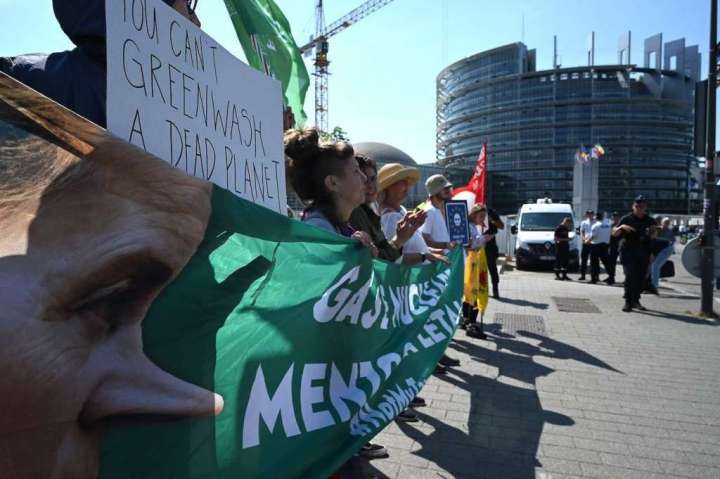BRUSSELS — European lawmakers will vote Wednesday on whether nuclear power or natural gas can ever be labeled “green” energy sources, a closely watched decision that could shape Europe’s climate policy for years to come.
Amid energy crisis, E.U. lawmakers decide if gas, nuclear can be ‘green’

In February, weeks before Russia’s attack on Ukraine, the E.U.’s executive arm presented a plan to classify some natural gas and nuclear power as “transitional” green investments in some circumstances, spurring a furious backlash.
Five months later, as Russia wields gas as a weapon and the global energy crisis intensifies, the question is even more controversial — and central.
At the heart of the debate is whether gas-fired generators and nuclear power plants can ever, under any circumstances, be considered sustainable or green.
Before the war, the inclusion of gas was backed by member states that said it was needed as a “bridge” as countries weaned themselves off fossil fuels and increased their renewable capacity. France and others pushed for the inclusion of nuclear power, despite strong opposition from Germany.
The plan was opposed not just by environmentalists but by some E.U. advisers and even the CEO of a group representing large investors. Critics said the European Commission’s effort to “protect private investors from greenwashing” risked turning into greenwashing on an even larger scale.
Russia’s war in Ukraine added new wrinkles to the debate. The war in many ways has made Europe rethink its reliance on Russia, particularly when it comes to Russian fossil fuels, and has amplified calls for an accelerated energy transition.
The E.U. has agreed to phase out imports of coal and oil from Russia to hit the Kremlin’s war chest. But the bloc remains dependent on gas from Russia — a fact not lost on President Vladimir Putin, who has used this leverage to threaten and punish.
Frans Timmermans, a top E.U. official who worked on the draft taxonomy, conceded Monday that the war has “changed something” when it comes to gas.
But defenders of the plan argue that the war has heightened the need for rapid investment in the infrastructure required to import gas from places other than Russia. They hope the new rules will spur a surge of investment in infrastructure such as new gas pipelines or facilities for the import of liquefied natural gas.
With the price of gas soaring, the war in Ukraine has also intensified interest across Europe in building new nuclear energy plants or extending the lives of old ones.
Officials and analysts expect a tight vote. A total of 353 lawmakers — just over half of the 705 in the European Parliament — would be needed to reject proposal. Since voting must be done in person, there is a chance that absences due to covid-19 could shape the vote.






